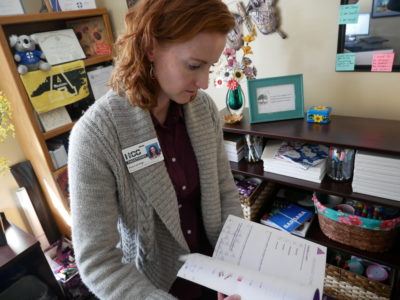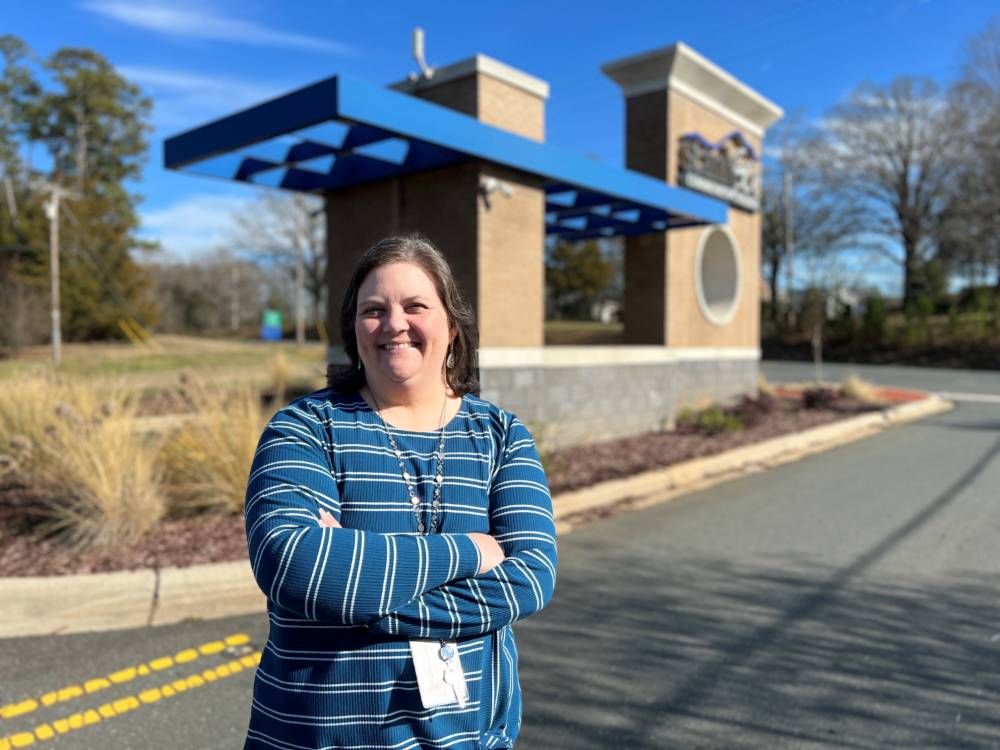

|
|
As the United States faces an “unprecedented mental health crisis,” community colleges across North Carolina are working to bolster their resources for students.
For many of the state’s 58 community colleges, such work includes training for faculty and staff, along with holistic, wrap-around resources for students.
Dr. Kara Finch, the dean of public services at Stanly Community College (SCC), told EdNC last spring that focusing on mental health is crucial for campuses across the state. Finch, who is also the head of the college’s human services program, won the 2022-23 N.C. Community College System’s (NCCCS) Excellence in Teaching Award, in part because of her efforts to reduce barriers for students and share mental health best practices.
“I found my purpose here at Stanly, not only to be an educator and an effective leader, but to really bring out the importance of us being a trauma-informed campus and recognizing mental health challenges in our students, and even faculty and staff,” said Finch, who is also an active Mental Health First Aid instructor. “I’ve been able to train hundreds and hundreds of people in suicide prevention and how to recognize when someone may be suicidal and what to do in those situations. But one of the biggest accomplishments that I’m super proud of here is that we have trained over 100 faculty and staff in mental health.”
To date, Finch has helped trained 115 faculty and staff members at SCC, and about 20 students are scheduled to be trained in November.
As a former community college student herself — she graduated from SCC in 2003 — Finch knows how crucial support is for student success.
Finch started her undergraduate career at a university but within her first year transferred to SCC to finish her associate degree. The relationships she made with advisors and instructors there were hugely impactful, Finch said, “because that actually not only helped me get to where I am today, but it also led me to what I’m doing today.”
“Kara continuously seeks ways to build relationships with students to better understand their situations and teach equitably and reduce any barriers from learning,” said SCC President Dr. John Enamait. “In addition, she shares best practices and training she receives with others at the college so that everyone remains committed to both student and employee success.”
One practical way that Finch seeks to address student barriers in her classroom is through what she calls “compassion tickets.”
The card prompts students to fill out three things they need to be successful in her class, and “gives them an opportunity to share with me anything they want to tell me about themselves.”
Often, those cards reveal a host of student barriers, which can exacerbate challenges with mental health: lack of transportation, financial issues, family problems, or food insecurity, among others.
“There’s not one student that does not have something going on,” Finch said.
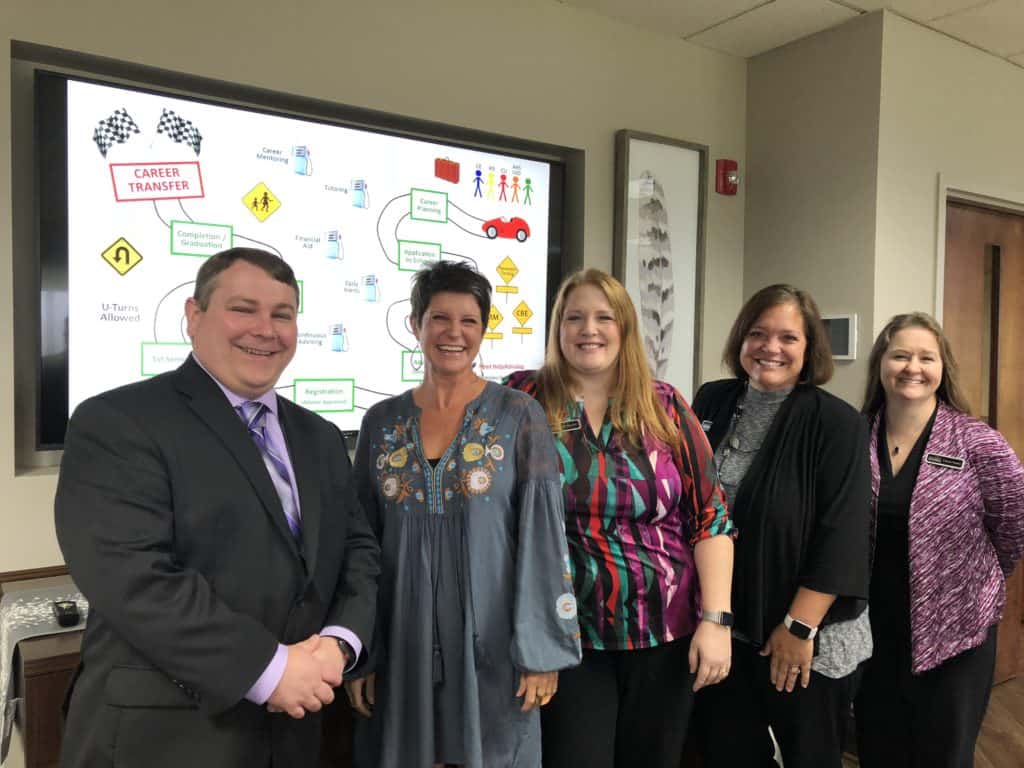

The problem
In December 2021, U.S. Surgeon General Vivek Murthy issued an advisory for youth mental health.
Upward of 44% of college students report symptoms of depression and anxiety, according to a 2021 report by the Mayo Clinic Health System, and suicide is their third leading cause of death.
As EdNC previously reported, North Carolina’s community colleges are on the front lines — experiencing the increased mental health challenges of high schoolers and adult learners alike. The pandemic both revealed and exacerbated mental health issues across the country, leading to more colleges investing in counseling and other resources for students.
“Supporting the mental health of our students is paramount to their success,” former NCCCS president Dr. Thomas Stith said at the UNC System’s virtual 2022 Behavior Health Convening. “As we emerge from the pandemic and build momentum for a great comeback, the mental health toll that faces our students will need to be addressed.”
Early in the pandemic, the number of North Carolinians who reported experiencing symptoms of depression or anxiety increased from one in nine to one in three, state Secretary of Health and Human Services Kody Kinsley said in a presentation about the state’s pandemic response during the UNC convening. That increase disproportionately impacted younger populations, he said.
The demand for college counseling services increased across the board, Brett Scofield said at a different convening presentation. Scofield is the co-interim senior director at Penn State University’s Center for Counseling and Psychological Services. He’s also the executive director of the Center for Collegiate Mental Health (CCMH), a research network of over 650 colleges.
“When you have an increase in demand for services without concurrent support to find those services,” Scofield said, “counseling centers have to shift models.”
As a result of such increased demand, counseling services increasingly devote resources to rapid access and brief interventions. At the same time, access to routine counseling usually decreases.
“Faculty, staff, students, families, administrators in the university have an expectation of what the counseling center can do that is well beyond probably what they’re funded to do,” Scofield said. “Mental health in higher ed is described as a crisis, but we think the crisis is the capacity to treat them — not necessarily the number of students that are seeking services.”
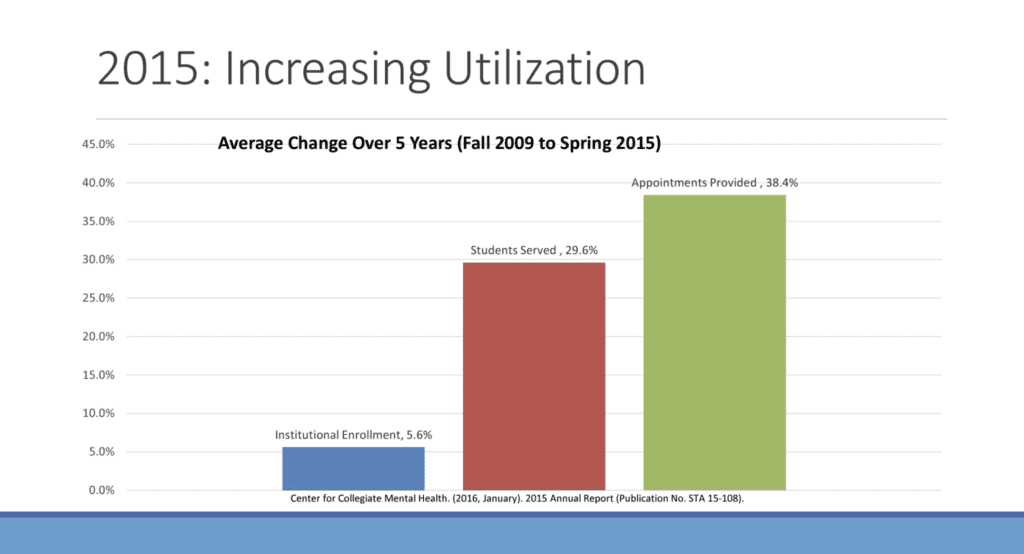

Such trends also hold true across N.C. community colleges.
In Nov. 2022, LaTasha Bradford told the State Board of Community Colleges that addressing mental health is crucial to enrolling and retaining more students. At the time, Bradford was the Board’s student member and president of the North Carolina Comprehensive College Student Government Association (N4CSGA).
Bradford highlighted the following findings from the N4CSGA’s student survey.
- 80% of students said they had a mental health disorder or challenge at the time of the survey.
- 60% of respondents said that mental health resources would enhance their college success.
- 30% of students said they believed they have a mental health disorder that has not been officially diagnosed.
“There’s still a stigma that’s associated with mental health, and students fear they may be stigmatized,” Bradford told the Board. “It’s a question of accessibility and affordability — being able to actually get services to have that diagnosis for mental health. So the even greater question is, ‘What can we do to assist and help?'”
At the time, and in the months following, Board members repeatedly raised the issue of addressing student mental health needs.
Some colleges have opted to provide on-campus counseling services, while others have partnered with local providers.
At the end of the day, these resources cost money. Given that many colleges used federal COVID-19 relief monies for such services — the last of which are set to expire in 2024 — finding stable funding sources is important.
“We have to get our arms around this issue and get something in place,” former Board Chair Burr Sullivan said in response to Bradford’s presentation. “It’s complicated, and I think we have some local colleges who are trying to address it, but this is not something that’s going to go away on its own.”
In 2021, public funds paid for one person at each community college to receive mental health training — like the training Finch provides at Stanly Community College. In Feb. 2023, Gov. Roy Cooper announced a $7.7 million investment to launch new mental health programs and sustain existing ones like Mental Health First Aid.
That money funded suicide prevention training for faculty and staff across community colleges. Last month, during Suicide Prevention Month, Finch offered QPR suicide prevention training to faculty and staff at Stanly and McDowell Technical communities colleges.
As of Sept. 30, those mental health funds had been exhausted, Finch said.
While the new state budget does not include explicit funds for mental health resources at community colleges, it is expected to expand Medicaid to more than 600,000 North Carolinians, starting Dec. 1, 2023.
Advocates have previously said Medicaid expansion is crucial to addressing mental health issues.
“If we’re going to make a meaningful difference in our mental health and substance use disorder challenges, we have got to have Medicaid expansion,” Kinsley said in April 2022. “Because without dollars for care, we’re only treating people in crisis. And if we’re only treating people in crisis than we have already lost the battle.”
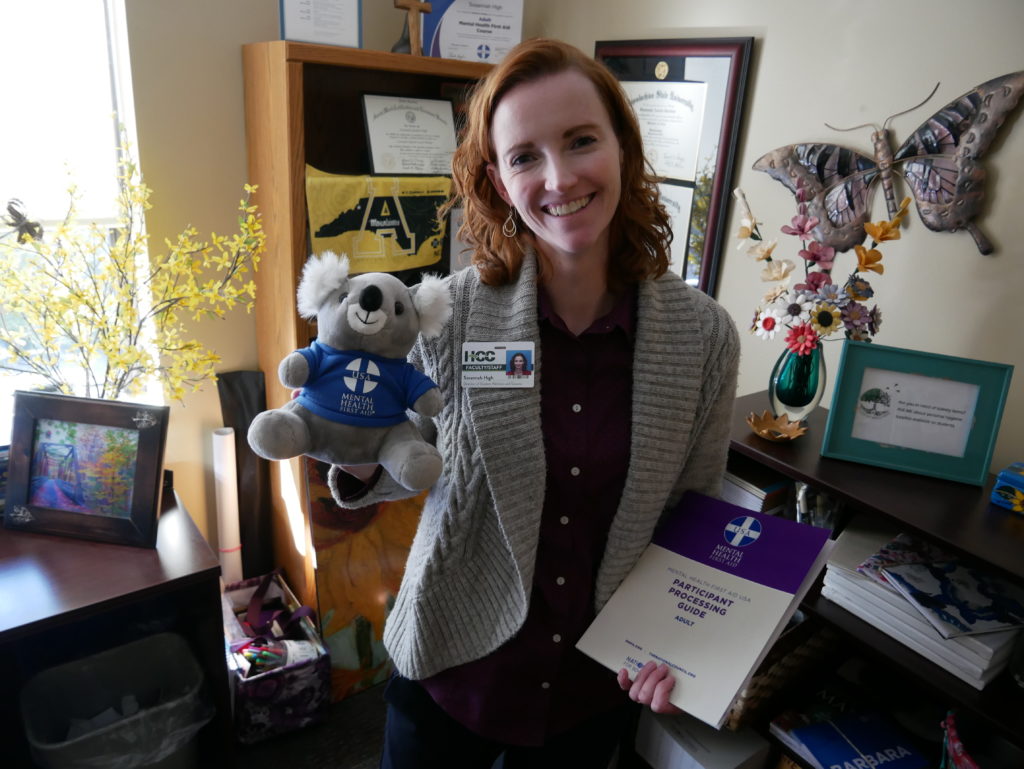

Best practices
A 2023 report by the RAND Corporation offers several ways for community colleges to better support student mental health needs.
The report studied eight community colleges across the country, finding that “although the institutions did offer mental health services, most lacked a clear organizing framework for those efforts, and that financial challenges limited the support offered to students.”
Other key findings from the report include:
- Community colleges in the study have expanded their mental health support programs through integrating them in the broader college environment.
- While community colleges in this study offered multiple levels of mental health supports, most lack a clear organizing framework. “Community colleges should consider adopting and formalizing a strategic plan or framework to improve coordination and collaboration across efforts, reduce redundancies, and guide decision making about resource allocation,” the report says.
- Community college leadership should consider explicitly supporting prioritization of student mental health, and broad staff buy-in is important.
- Community colleges struggle to meet students’ mental health needs because of limited resources.
- Financial support for student mental health should extend beyond high school.
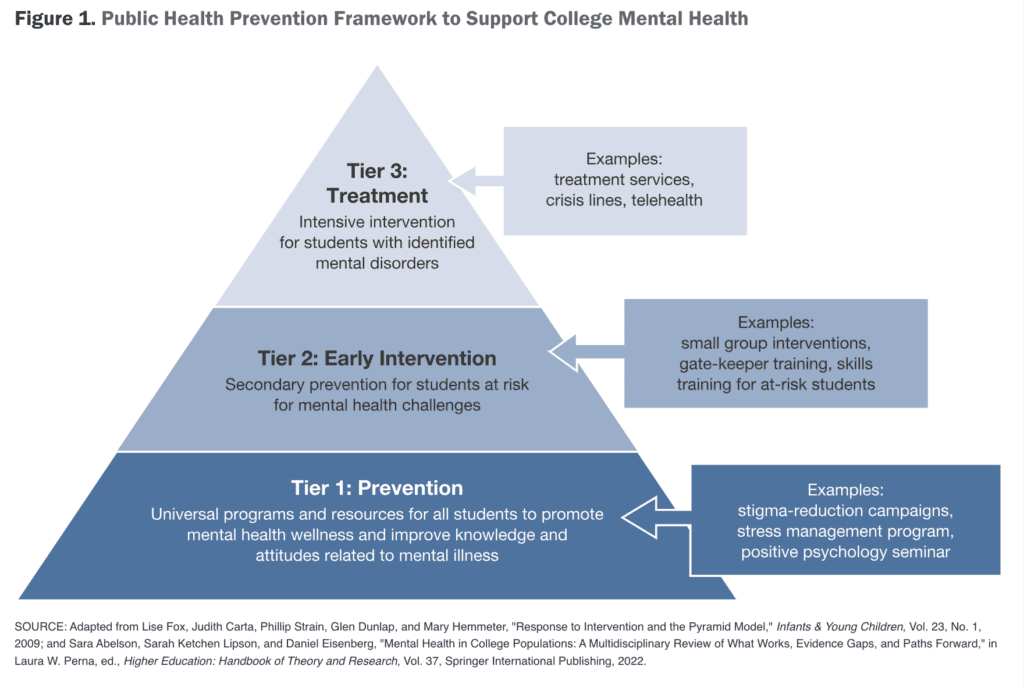

Community college leaders have also told EdNC that addressing holistic student needs is critical to supporting mental health.
Marbeth Holmes, the dean of student success at Nash Community College, previously said part of investing in student mental health is addressing barriers related to education, health care, and food. At community colleges, 20-40% of students face food insecurity, she said, and 50% are housing insecure.
In a “rural resource desert,” like Nash County, Holmes said the college must prioritize meeting basic needs among its students. She noted that such needs disproportionately impact Black, Latino, Native, first-generation, disabled, and LGBTQ+ students.
N.C. community colleges have worked to offer resources for such specific student populations, including veterans and LGBTQ+ students, among others.
Most important to Holmes, Nash Community College works to build relationships with students, something she said all colleges must do to effectively meet mental health needs.
“We work very hard to build trust,” Holmes said. “If they trust us, they will utilize our services. If they utilize our services, their work and their stability and their wellness will improve — so that’s fundamental.”
Finch said community colleges should focus on several “necessary and pressing” issues related to mental health.
- First, community colleges must be proactive instead of reactive. “This means providing information regarding mental health concerns, depression, anxiety, how to manage stress, and the importance of self-care early on with students,” she said. “For example, here at SCC, we have a module in our New Student Orientation that addresses all of these things and also shares the resources we have on campus for them.”
- Colleges should also assess the mental health climate on campus to know the areas of concern for students. At SCC, Finch helped start a Mental Wellbeing Survey that goes out every semester.
- Faculty and staff must be trauma-informed and understand how to recognize the signs and symptoms of mental health and substance use challenges.
- While online/virtual counseling is a great resource, colleges should also invest in having a counselor on staff. “We never know when a student is going to have an immediate need or crisis,” Finch said. “Having a trained staff member who can step in and assist is crucial in these situations.”
For Finch, it’s also important that colleges support each individual student’s goals, rather than a one-size-fits-all version of success.
Typically, the system classifies completion or graduation as success, she said. But success can look different for every student — completing one class, earning a certificate, or getting a job based on their already completed coursework. If colleges can cheer on their students through a variety of successes, Finch believes they will offer a stronger support system overall.
“And for students to persist and complete, they have to have a good support system, whether that’s faculty and staff on campus, family members, friends, a preacher, you know, somebody who is in their corner and is encouraging them and pushing them to do well,” Finch said. “And people who also recognize that you’re not perfect, things are going to happen. Life happens, but if you can push through those difficult times and keep going, you’re going to be so much better off in the end.”
How is your college working to support mental health on campus? We’d love to know! Email me at hmcclellan@ednc.org.




